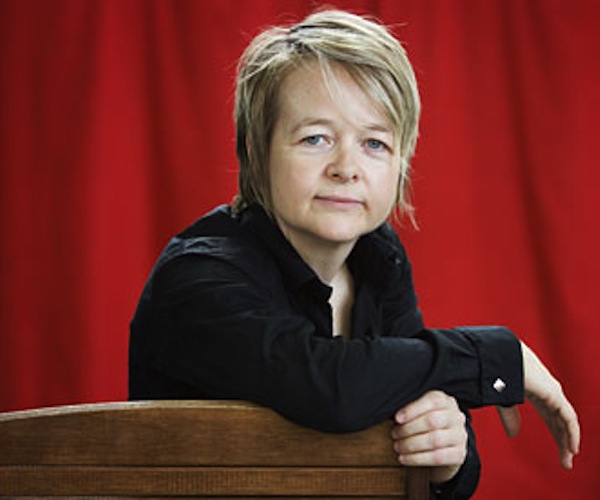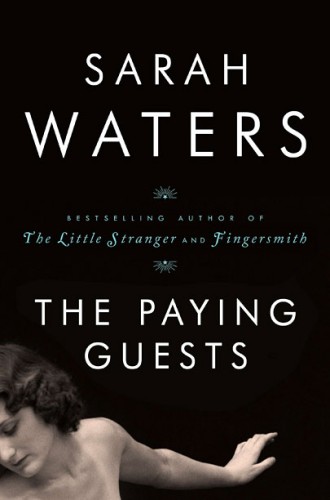Book Review: “The Paying Guests” — Sarah Waters Serves Up More of History’s Ghosts
We all have ghosts, the author seems to say. And in a larger sense, Sarah Waters’s ghosts are those of country and culture, her books a catalogue of the social changes shaking England from the Victorian era on.
The Paying Guests by Sarah Waters. Riverhead, 568 pp., $28.95
by Clea Simon
Sarah Waters has a knack for ghost stories. Without flash or sensation, she has perfected the kind of dark brooding that haunts readers as well as her troubled characters and gives her latest subtle thriller, The Paying Guests, an irresistible momentum.
Those ghosts have taken various forms in the British author’s six novels. In Waters’ more Gothic outings, 2009’s sprawling The Little Stranger and the more intimate Affinity (1999), they were often literal – spectral visitors whose appearances played up the spooky obsessions prevalent in the periods of her carefully imagined historical fiction. In her latest, the spirits of the past are equally haunting but exist only in the realm of memory, as the longing for a lost love – and a lost way of life – drives the protagonist’s quiet desperation.
The Paying Guests opens in 1922, on the tree-lined streets of Camberwell. Although this neighborhood, where the 39-year-old “spinster” Frances Wray lives with her widowed mother, is still considered one of London’s nicer areas, the toll of the recent war is evident. Unemployed veterans beg or threaten, and the Wrays – much to their chagrin – have been forced to take in boarders (the “paying guests” of the title is a genteel euphemism) to make ends meet. The arrival of the young married couple, Lilian and Len Barber, promises to relieve the Wrays’ penury: mother and daughter have been reduced to sharing the same bath water. But the ensuing bustle and clatter does nothing for the new landladies’ still-raw grief, which Waters beautifully imagines in her precise, detailed prose.
“It might be Noel or John Arthur up there,” says Frances’s mother, remembering the sons killed in the war. “And, yes, thought Frances a moment later, lingering in the shadowy hall, it might be; for she could smell tobacco smoke now, and hear some sort of masculine muttering up on the landing, along with the tap of a slippered male foot … And just like that, like a knee or an elbow receiving a blow on the wrong spot, her heart was jangling. How grief could catch one out, still!”
What becomes clear, as the two families settle in, is how much they have all lost. Frances, in particular, is mourning not only her brothers but a lover – and the dream of a life independent of her family and its Victorian era proscriptions. And while Frances does her best to shield her mother from their perceived loss of status – doing the heavy cleaning formerly performed by servants only when her mother is out, for example – she herself receives little comfort in return. Until, that is, the possibility of a new romance threatens to break open her increasingly circumscribed world.

Sarah Waters — The ghosts in her popular books are those of country and culture. Photo: A Common Reader.
Waters has said that this book was inspired by a notorious 1920s murder trial, known as the Thompson-Bywater case, which also involved infidelity. In Waters’s reinterpretation, the wife’s lover is a woman, and the implications of the closeted lesbian affair play into the surprising resolution of the case. But while this book involves a criminal trial, most of its suspense is psychological: Frances falls in love once again and must wrestle with her doubts and suspicions, both of her lover and herself.
We all have ghosts, the author seems to say. And in a larger sense, Waters’s ghosts are those of country and culture, her books a catalogue of the social changes shaking England from the Victorian era (2002’s Fingersmith, Affinity, and her groundbreaking 1998 debut, Tipping the Velvet) through World War II (2006’s The Night Watch) and its aftermath (The Little Stranger). It’s no accident that The Paying Guests takes place in a period of retrenchment: the liberating effect of the war having given way to an aggressive social conservatism reminiscent of movements we still see today. When the book opens, Frances, a former suffragette, has been forced back into the customary. But history cannot move backward. We have all been wounded, Frances’ story shows us. The only question is whether we have the strength to move on.
**********
The Harvard Book Store is presenting Sarah Waters reading from The Paying Guests during a conversation with Emily M. Danforth at the Brattle Theatre, Cambridge, MA on September 18th at 6 p.m.
A former journalist, Clea Simon is the author of three nonfiction books and 15 mysteries. A contributor to such publications as the Boston Globe, New York Times, and San Francisco Chronicle, she lives in Somerville with her husband, Jon Garelick. She can be reached here and on @Clea_Simon.

